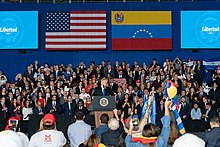Foreign involvement in the Venezuelan presidential crisis
[15] The reactions included the arrest of Antonio Ledezma in February 2015, forcing American tourists to go through travel requirements and holding military marches and public exercises "for the first time in Venezuela's democratic history".
After more controversies and pursuing a recall on Maduro, on 2 May 2016, opposition members of the National Assembly met with OAS officials to ask for the body to implement the Democratic Charter.
[25] When meeting with Latin American leaders during the seventy-second session of the UN General Assembly, President Donald Trump discussed possible United States military intervention in Venezuela, to which they all denied the offer.
[34] The Redes Foundation denounced in the Colombian Public Ministry that armed groups made up of ELN members and FARC dissidents, supported by the Bolivarian National Police and FAES officials, murdered two Venezuelans, Eduardo José Marrero and Luigi Ángel Guerrero, during a protest in the frontier city of San Cristóbal, on Táchira state.
[39] Defected Venezuelan Lieutenant José Montiel López in the US said in an interview with The Washington Post that Cuban military disguised as civilians acted as "our supervisors and decision-makers”.
[45] Iranian Foreign Minister Mohammad Javad Zarif, suggested that Iran could send IRGC personnel to Venezuela to protect President Maduro.
[48] According to the Newsweek, "The presence of Russian, Chinese and Iranian planes in Caracas has outraged the U.S., which already has troops based in neighboring Colombia and in other countries across a region long targeted by Washington's efforts to halt the spread of leftist ideologies.
"[49] According to Giancarlo Fiorella, writing in Foreign Affairs, the "loudest calls for intervention are coming not from the White House and its media mouthpieces but from some members of the Venezuelan opposition and from residents of the country desperate for a solution—any solution—to their years-long plight.
[51] Following the unsuccessful attempt to bring humanitarian aid into Venezuela on 23 February, a political faction supported by National Assembly deputy María Corina Machado began to demand application of Article 187, to "open the way" for "foreign intervention in order to prevent crimes against humanity".
[31] The National Assembly approved in July 2019 the reincorporation of Venezuela to the Inter-American Treaty of Reciprocal Assistance (Tratado Interamericano de Asistencia Recíproca).
[56] Professor Robert Ellis of the United States Army War College described 400 Wagner Group mercenaries provided by Russia as the "palace guard of Nicolás Maduro".
[59] On 3 March 2019, Russian Federation Council speaker Valentina Matviyenko told Venezuelan Vice President Delcy Rodríguez that Russia would make every effort to prevent military intervention in Venezuela and believes that the crisis was artificially created by the US, which can be solved only through dialogue.
[59] Alexey Seredin from the Russian Embassy in Caracas said the two planes were "part of an effort to maintain Maduro's defense apparatus, which includes Sukhoi fighter jets and anti-aircraft systems purchased from Russia".
[61] Vladimir Zaemsky, Russia's ambassador to Venezuela said that the Russian military is helping their Venezuelan counterparts to defend themselves in the face of the "threat of the use of force" by the United States.
[87] On 10 December, a group of around forty Russian soldiers arrived to Canaima, Bolívar, on a Shaanxi Y-8 plane landing on the runway that serves as the entry to the National Park.
Locals assured that the soldiers wore uniforms of the Venezuelan Armed Forces and that they carried crates with microwave equipment, satellite antennas, signal inhibitors, and other devices.
The Russian Foreign Ministry said that the appointment contributes to the return of the intra-Venezuelan political struggle to the constitutional field that will find a peaceful exit to the ongoing crisis.
[89] Opposition deputies denounced that Russia looked after supporting Parra to improve its businesses in Venezuela, including to increase the Russian shareholder participation in oil contracts and other mining concessions that need the approval of the National Assembly and that it would not have with Guaidó.
[90] Venezuelan media reported on 7 May, after the Macuto Bay raid, that Russian Special Operations Forces were assisting Maduro with surveillance from unmanned aerial vehicles.
[91] During the crisis in Venezuela, the United States, the European Union, Canada, Mexico, Panama and Switzerland have applied individual sanctions against people associated with Maduro's administration, including government officials, members of the military and security forces, and private individuals alleged to be involved in human rights abuses, corruption, degradation in the rule of law and repression of democracy.
Public Radio International (PRI) said the sanctions targeted Maduro and Chavismo "elites", while "they've done little to make an impact on ordinary Venezuelans, whose lives have spiraled into a humanitarian crisis as hyperinflation has driven nearly 3 million to flee.
"[92] In January 2019, during the presidential crisis, the United States imposed sanctions on the Venezuelan state-owned oil and natural gas company PDVSA to pressure Maduro to resign.
[98] The Maduro administration issued a statement saying that it "energetically rejects the unilateral, coercive, arbitrary and illegal measures" that would affect banking for millions of people.
[100] In a speech on 17 April 2019 in Miami on the anniversary of the failed 1961 Bay of Pigs Invasion, Bolton announced new restrictions on U.S. dealings with the three countries he calls the troika of tyranny—Cuba, Nicaragua and Venezuela—as "part of a broader set of policies" aimed at "reversing the Obama administration's embrace" of Cuba.




